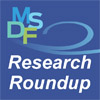MS Research Roundup: October 16, 2015
Highlights from the 2015 meeting of the European Committee for Treatment and Research in Multiple Sclerosis (ECTRIMS) in Barcelona: B-Cell Bashing Ocrelizumab; New Outcome Measure for Daclizumab
MS Research Roundup collects items of interest in multiple sclerosis research from around the Web. Send us your tips: tips@msdiscovery.org.
 B-Cell Bashing
B-Cell Bashing
In Barcelona, the buzz was all about B cells and ocrelizumab, an experimental MS drug that blocks them in a way that helps people with MS. Crowds packed the hall for two talks in particular. Ocrelizumab was more effective than interferon for relapsing-remitting MS by many measures, said Stephen Hauser, MD, of the University of California, San Francisco, who presented early findings of two large clinical trials called OPERA I and OPERA II. In the primary endpoint of the phase 3 studies, ocrelizumab reduced the annualized relapse rate by about half and convincingly outperformed interferon on other secondary and exploratory endpoints, including disability progression and multiple MRI outcomes. Adverse events were roughly comparable, except for a much higher reaction to the first of four infusions given every 6 months for nearly 2 years.
The next day brought details of ORATORIO, the first major study to show a benefit in a progressive form of MS. The anti-CD20+ therapy ocrelizumab reduced the proportion of patients with primary progressive MS who had 12-week confirmed disability progression by 24 percent compared with placebo. The therapeutic effect was modest but encouraging, said Xavier Montalban, MD, PhD, of Vall d'Hebron University Hospital in Barcelona, Spain, who presented the findings. Others agreed. In adverse events, the ocrelizumab had more malignancies. Drugmaker Roche/Genentech’s new agent, a humanized monoclonal antibody, may have competition from its older anti-CD20 drug, rituximab, used off label for MS, according to other less rigorous results presented at the meeting. (MedPage, National MS Society)
Daclizumab Meets NEDA
At last year’s ECTRIMS meeting in Boston, it was the early phase 3 findings from daclizumab making headlines. The humanized monoclonal antibody binds to the CD25 subunit of the high-affinity interleukin-2 receptor, and works in multiple ways on T cells and natural killer cells to counteract MS. Those results were published Oct. 8 in the New England Journal of Medicine, spelling out more details behind the main finding that daclizumab reduced the annualized relapse rate by nearly half compared to interferon. “The enhanced efficacy was accompanied by an increased frequency of adverse events, such that the net clinical benefit will need to be carefully considered by patients and their providers,” Ludwig Kappos, MD, of University Hospital, Basel, Switzerland, and his co-authors conclude in the paper. In Barcelona, Kappos held the daclizumab results to a higher standard: no evidence of disease activity (NEDA). A cross-section of data at week 96 in the study showed that about twice as many patients on daclizumab (24.3 percent) met NEDA standards compared to those on interferon (13.9 percent). That means no relapses, no onset of disability progression, and no new T2 nor gadolinium-enhancing lesions. (BMJ Blogs, MS Discovery Forum, US News & World Report)
Read other MS Research Roundups.


